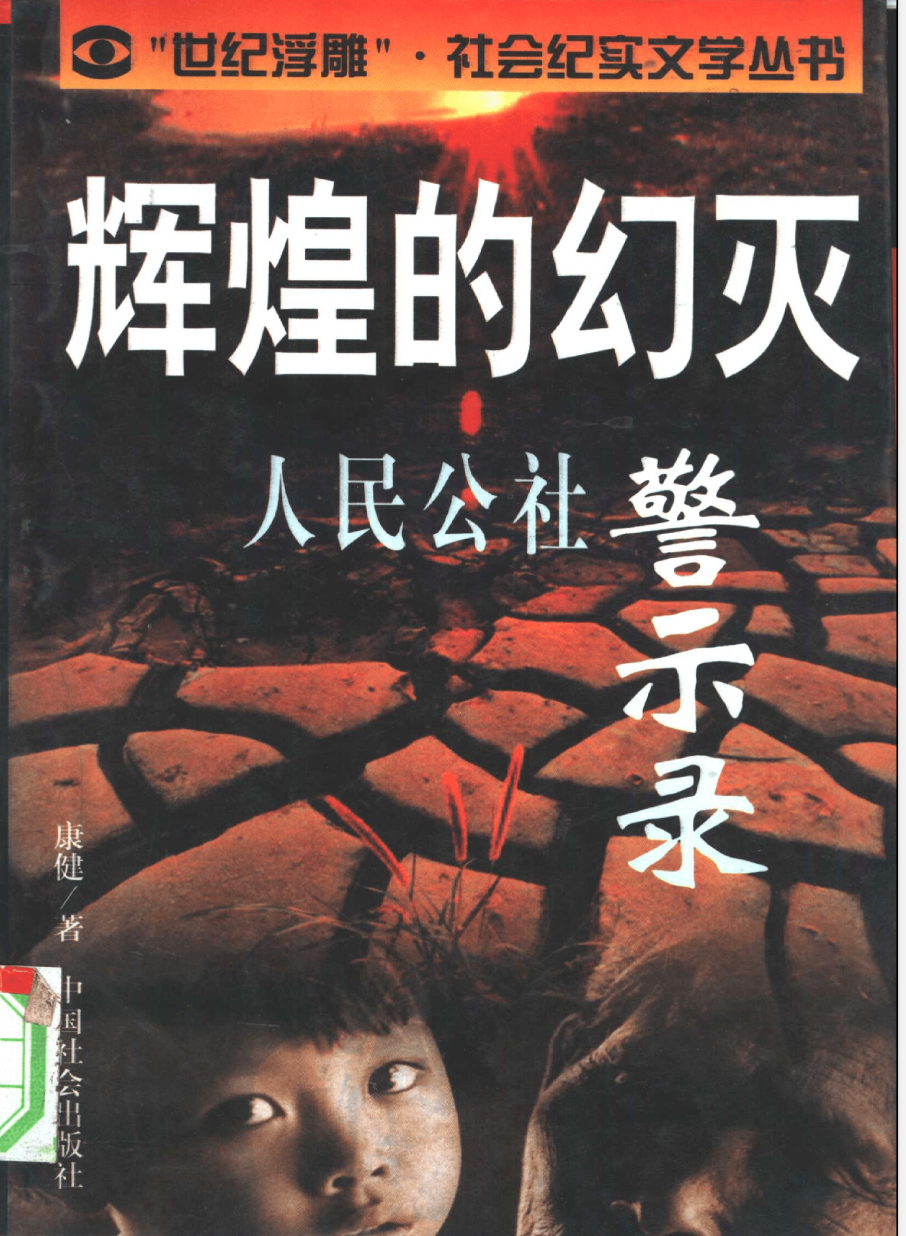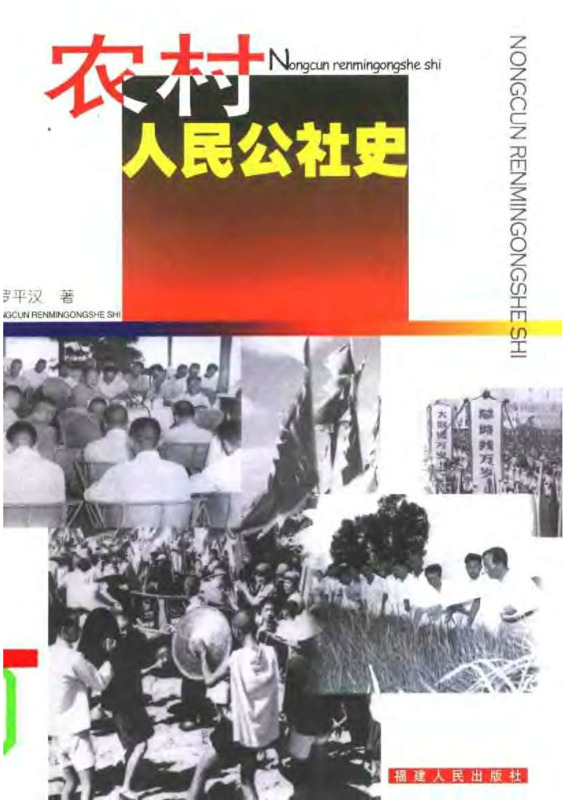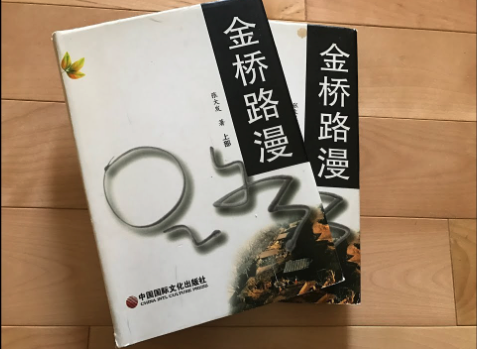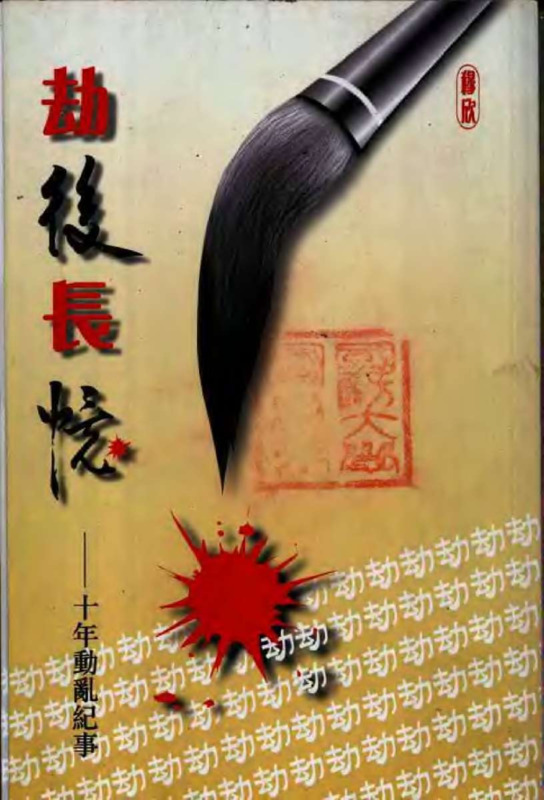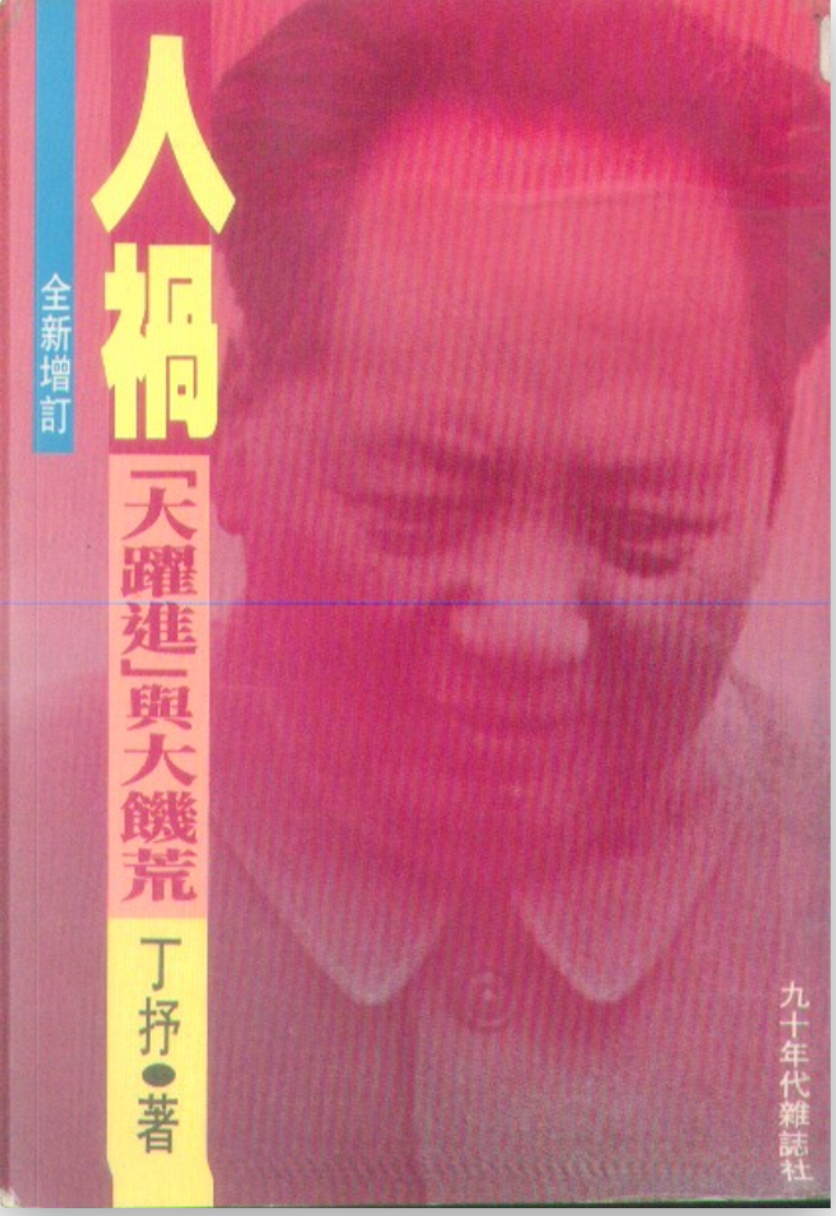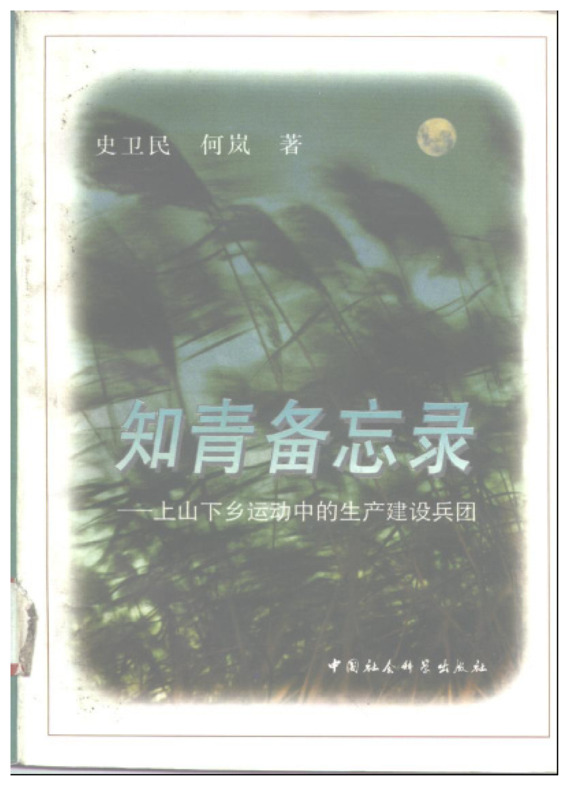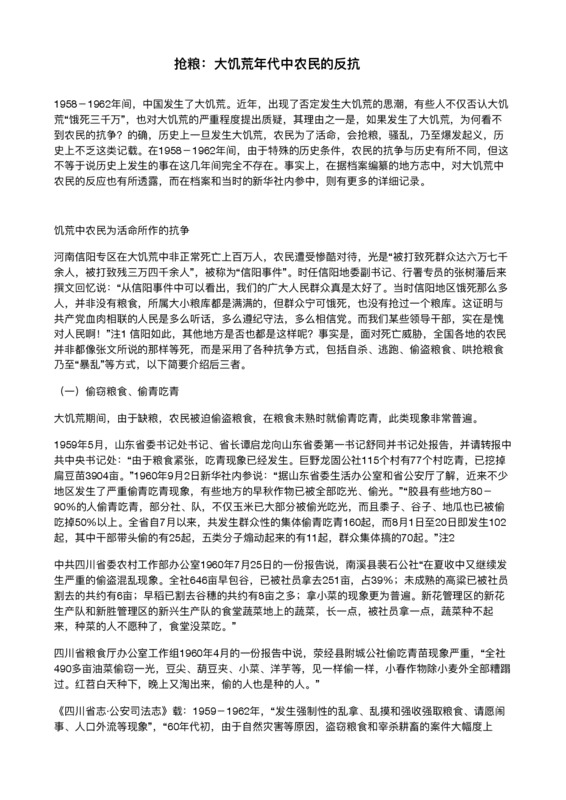Explore the collection
Showing 24 items in the collection
24 items
Book
China's "Left Scourge"
The author of this book, Lu Jianhua (pen name Wen Lu), was a former member of the Chinese Academy of Social Sciences who published this book in 1993. He was sentenced to 20 years in prison in 2005 for "allegedly leaking state secrets" in connection with the "espionage case" involving journalist Cheng Xiang.
Book
Disillusionment of Splendor: A Cautionary Tale of a People's Commune
This book tells the story of China's first people's commune - the Chayashan People's Commune in the author's hometown. Chayashan is a township located in Suiping County, Xinyang City, southern Henan (now part of Zhumadian District). It is the location of the country's first people's commune established by Mao Zedong in 1958, and was also a model commune during the Great Leap Forward period. At the Lushan Conference in 1959, the commune was used in Mao Zedong's counterattack against Peng Dehuai, a general who opposed Mao's policies.
The author Kang Jian is a war veteran. More than thirty years after the Great Famine, Kang Jian visited the villages in Chayashan to conduct an oral history investigation. He used oral interviews to record the daily lives and experiences of farmers under collective economic practices. The author writes in the form of interviews, showing the history of Chayashan People's Commune in detail, and using specific cases to present the relationship between national political behavior and individual destiny.
Article
Facts of the 1958-1962 Disaster in Fengyang County, Anhui Province
The author of this book, Luo Pinghan, is a native of Anhua County, Hunan Province. He graduated from the Party History Department of Renmin University of China and served as director and professor of the Party History Teaching and Research Department of the Party School of the Central Committee of the Communist Party of China. This book was published by Fujian People's Publishing House in 2003.
With Mao Zedong's affirmation, the system of people's communes was rapidly promoted across the country in 1958. At that time, the people's commune was both a production organization and a grassroots political power. Its rise and fanatical development are closely related to the subsequent Great Famine.
As a scholar within the system, the author’s view of history also belongs to orthodox ideology. Although this book is narrated from the official ideology of the CCP, it uses rich and detailed historical materials to comprehensively and systematically introduce the history of the People's Communes, giving it a reference value for a comprehensive understanding of this movement.
Article
Famine and Village: Who Starved Them to Death?
The author of this article, Chen Feng, was born in 1962. His hometown is Huang Sichong, Sanjia Brigade, Bainong Commune, Feidong County, Anhui Province. According to his records, in the winter of 1959 to the spring of 1960 during the Great Famine, his grandfather, grandmother, grandfather, grandmother's relatives and relatives, and countless members of his extended family and village, 57 people died of starvation.
Book
Fifty Years of the Chinese Communist Party
The author Wang Ming was an early member of the Communist Party of China (CCP) and the first of the "28 and a half Bolsheviks," who lost power after the Yan'an Rectification and were gradually marginalized by Mao. After the Yan'an Rectification, the Internationalists, led by him, lost power in the party. He was gradually ostracized by Mao Zedong, who expatriated him to the Soviet Union in 1956. In his book, Wang Ming recounts his decades-long feud with Mao. It provides a fascinating insight into the early history of the CCP.
Book
History of the Rural People's Commune
The author of this book, Luo Pinghan, is a native of Anhua County, Hunan Province. He graduated from the Party History Department of Renmin University of China and served as director and professor of the Party History Teaching and Research Department of the Party School of the Central Committee of the Communist Party of China. This book was published by Fujian People's Publishing House in 2003.
The book is divided into nine chapters, narrating the history of the people's communes from the perspective of an orthodox view of historical development. The time nodes selected by the author include the rise, tide, adjustment, repetition, retreat, and disintegration of the Great Leap Forward. With Mao Zedong's affirmation, the system of people's communes was rapidly promoted across the country in 1958. At that time, the people's commune was both a production organization and a grassroots political power. Its rise and fanatical development are closely related to the subsequent Great Famine.
As a scholar within the system, the author’s view of history also belongs to the orthodox ideology. Although this book is narrated from the official ideology of the CCP, it uses rich and detailed historical materials to comprehensively and systematically introduce the history of the People's Communes, giving it a reference value for a comprehensive understanding of this movement.
Book
In Search of Famine Survivors
This is the first book in author Eva's "Famine Trilogy," in which she traveled to Qin'an County, Tongwei County, and Tianshui District in Gansu Province as well as to Yaozhou and Tuxian County in Shaanxi Province in 2011. She interviewed more than two hundred survivors of the Great Famine, with the oldest person being ninety-five years old and the youngest being fifty-eight years old. This book allows these lowest class, mostly uneducated peasants to speak and provide their own witness, leaving behind their voices and oral history. Based on interviews with more than fifty interviewees, the book contains the names of more than five hundred victims and forty-nine incidents of cannibalism.
Book
Jin Qiao Lu Man
During the three years of famine from 1959 to 1961, Tongwei's unnatural deaths due to starvation and its related factors amounted to one-third of the county's population. Mr. Zhang Dafa, who worked in Tongwei for many years and later took part in the preparation of the new Tongwei County Record. Published in 2005 through the Dingxi Writers' Association, this is a collection of his many social research reports on the Tongwei issue, "Jinqiao Luwan," which profoundly reveals the tragedy and gravity of the Great Famine, a man-made disaster, within the boundaries of a single county.
Book
Long Memories after the Hijacking -- Chronicle of Ten Years of Turmoil
The author of this book, Mu Xin, was an early member of the CPC and served as chief editor of "Guangming Daily" in the 1950s. At the beginning of the Cultural Revolution, he was a member of the Central Committee's Cultural Revolutionary Group. In 1967, he was defeated and imprisoned in the Imperial Prison (Qincheng Prison). This book was published in Hong Kong in 1997. Because of the author's status, this book is helpful for understanding high-level circumstances during the pre-Cultural Revolution and early Cultural Revolution period.
Book
Lushan meeting factual record
This book is a historical record of the 1959 Lushan Conference written by Li Rui. Based on the author's personal experience and the literature of the relevant departments of the Communist Party of China, the author has recorded the important points and events before and after the meeting. The first edition of this book was published in April 1989 by the Spring and Autumn Publishing House and Hunan Education Publishing House in mainland China; the updated edition was published in June 1994 by Henan People's Publishing House.
Book
Man-Made Disasters: The Great Leap Forward and the Great Famine.
The author of this book, Ding Shu, is a Chinese scholar living in the United States. Published in 1991 by the Hong Kong-based "Nineties Magazine", this book is the first monograph on the Great Famine in China. It has been described by some scholars as the cornerstone of the study of the Great Famine in China. The book was later updated and reprinted. The book starts from the cooperative movement and moves on to the Great Leap Forward, the Great Iron and Steel Refining, the People's Commune, the Satellite Release and the Great Communist Wind; then, it turns to the Lushan Conference against right-leaning as well as the 7,000 People's Congress in 1962. The author collected almost all the information that could be collected at that time and summarized it to describe the situation of this great famine and its causes and consequences. The content of this book is from the website of the Chinese blog "Bianchengsuixiang" (编程随想).
Book
Mao: The Unknown Story
This book presents the dramatic life of Mao Zedong, revealing a wealth of unheard-of facts: why Mao joined the Communist Party, how he came to sit at the top of the Chinese Communist Party, and how he seized China step by step. Writers Jung Chang and her husband Jon Halliday took ten years to complete this book, interviewing hundreds of Mao's relatives and friends, Chinese and foreign informants and witnesses who worked and interacted with Mao as well as dignitaries from various countries.
Purchase link:https://www.amazon.com/Mao-Story-Jung-Chang/dp/0679746323.
Book
Memo of the Educated Youth: Production and Construction Corps of the "Down to the Countryside" Movement
During the Cultural Revolution, 14.03 million urban junior and senior high school students said goodbye to their parents and families and left the cities to receive "re-education" in the "wide world." 10.48 million young intellectuals who had been sent to the army or returned to their hometowns were resettled in rural communities and squads. 1.26 million were placed in the newly-formed youth collectives and teams, while another 2.29 million were accepted by state-run farms and production and construction corps. The production and construction corps became the most concentrated place for intellectual youths, and had an undeniably important position in the whole movement of educated youths going to the countryside. This book describes the rise and fall of the production and construction corps and the fate of the educated youths who went to the countryside during the Cultural Revolution.
Book
Newly Discovered Mao, The: Volume I
Author Wang Ruoshui spent his early years studying philosophy at Peking University. He served as deputy editor-in-chief of the Communist Party newspaper “People's Daily” and was able to participate in high-level ideological discussions, gaining a deep understanding of Mao Zedong as a person and of his thought. He was one of the rare intellectuals within the CCP system who had an independent personality as well as the ability to think for himself. After his death from cancer, his wife, Feng Yuan, helped put together this posthumous book. Published by Ming Pao Press in 2002, it has been described as "the first and most comprehensive and in-depth discussion of Mao Zedong and his thought."
Book
Newly Discovered Mao, The: Volume II
Author Wang Ruoshui spent his early years studying philosophy at Peking University. He served as deputy editor-in-chief of the Communist Party newspaper "People's Daily" and was able to participate in high-level ideological discussions, gaining a deep understanding of Mao Zedong as a person and his thought. He was one of the rare intellectuals within the CCP system who had an independent personality as well as the ability to think for himself. After his death from cancer, his wife, Feng Yuan, put together this posthumous book. Published by Ming Pao Press in 2002, it has been described as "the first and most comprehensive and in-depth discussion of Mao Zedong and his thought.
Article
Peasant resistance in the years of the Great Famine
Even today in China, some people have been trying to deny that there was a great famine in 1960. One of the reasons is: If there was a great famine, why did we not see the peasants' resistance? It is true that historically, in the event of a famine, peasants would loot grain, riot, and even break out in revolt in order to survive, but during the period 1958-1962, due to the special historical conditions, it seems that there is no record of peasants' resistance. But this was not the case. This article collects facts to prove the existence of peasant resistance.
Book
Personal experiences of political movements
This book is a collection of many authors, most of whom were former senior officials of the Communist Party of China, such as Li Rui, Xiao Ke and others. Through the author's recollections, we can learn about the political movements of the Mao Zedong era, including the Cultural Revolution, the Anti-Rightist Movement, etc., as well as the details of many unjust cases, such as the Hu Feng case, which is quite convincing. This book was published by the Central Compilation and Translation Bureau Press in mainland China in 1998.
Periodicals
Spark, Issue 1
<i>Spark</i> was an underground magazine that appeared in the Tianshui area of Gansu Province in northwestern China during the 1959-1961 Great Famine. The magazine was lost for decades but in the late 1990s began to be republished electronically, becoming the basis of documentary films, essays, and books.
In 1959, the Great Famine was spreading across China. It was witnessed by a group of Lanzhou University students who had been branded as Rightists and sent down to labor in the rural area of Tianshui. They saw countless peasants dying of hunger, and witnessed cannibalism.
Led by Zhang Chunyuan, a history student at Lanzhou University, they founded <i>Spark</i> in the hope of alerting people to the unfolding disaster and analyzing its root causes. The students pooled their money to buy a mimeograph machine, carved their own wax plates, and printed the first issue. The thirty-page publication featured Lin Zhao's long poem, "A Day in Prometheus's Passion." The first issue also featured articles, such as "The Current Situation and Duty," which dissected the tragic situation of society at that time and hoped that the revolution would be initiated by the Communist Party from within.
The students planned to send the magazine to the leaders of the provinces and cities with a view to correcting their mistakes. But before the first issue of Spark was mailed and while the second issue was still being edited, on September 30, 1960, these students in Wushan and Tianshui were arrested, along with dozens of local peasants who knew and supported them. Among them: Zhang Chunyuan was sentenced to life imprisonment and later executed; Du Yinghua, deputy secretary of the Wushan County Committee of the Chinese Communist Party, was sentenced to five years' imprisonment for having interacted with the students, and later executed. Lin Zhao was detained and also executed. Other key members, such as Gu Yan, Tan Chanxue, and Xiang Chengjian, were all sentenced to long years in labor camps.
In the 1990s, Tan Chanxue devoted herself to researching historical information and figures to bring this history to life. She found in her personnel file (<i>dan'an</i>)photographs of the magazine, as well as self-confessions and other evidence used in the students' trial. Eventually, the photos were collated into PDFs, which began to circulate around China.
Editors' note: This site the original handwritten version and a PDF of all the articles from the first issue of <i>Spark</i>. We will also make available transcripts of the essays in Chinese and are searching for volunteers to translate the texts into English. Please contact us if you're interested in helping!
Book
The Great Leap Forward: An Intimate Memoir
Li Rui, who once served as Mao's secretary, is also an expert on Mao Zedong. Like his famous <i>Proceedings of the Lushan Conference</i>, this book is also an important historical work. It focuses on the author's personal experience of the Great Leap Forward initiated by Mao Zedong.

